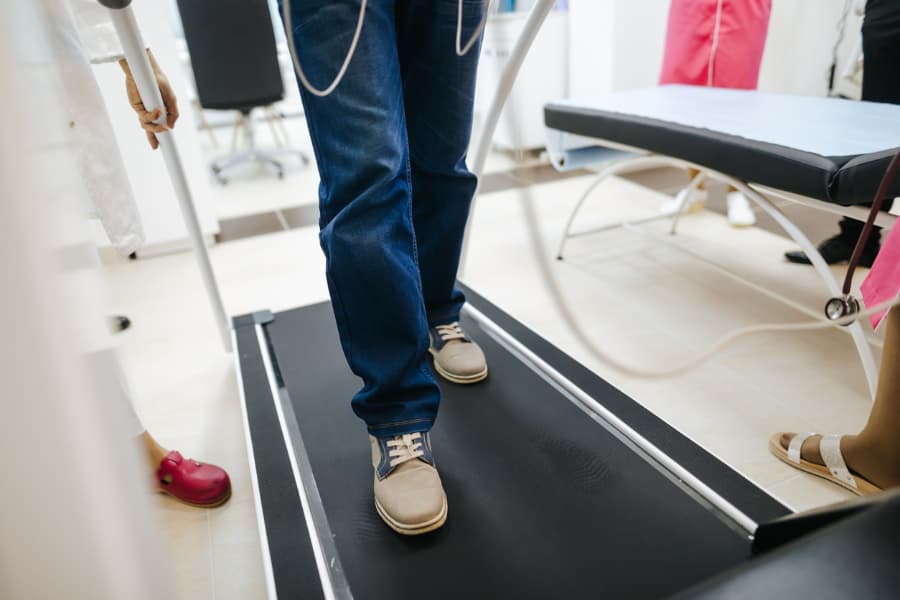Patients who have a problem with their heart or symptoms that point to heart trouble may be asked to undergo an exercise stress test. There are several types of these types of tests, including a stress echocardiogram and an electrocardiogram (EKG). Another type of exercise test used to evaluate the heart is the nuclear heart stress test. Learn more about this type of heart stress test from the expert cardiovascular specialists at Richmond University Medical Center.
What Is a Nuclear Heart Stress Test?
There are a few other names for the nuclear heart stress test. It may be identified as a cardiac positron emission tomography (PET), single-photon emission computed tomography (SPECT), or myocardial perfusion imaging. These terms indicate that two types of imaging modalities can be used in a nuclear heart stress test: PET and SPECT. For a nuclear heart stress test, a small amount of radioactive material is used as a tracer for imaging.
How Does a Nuclear Heart Stress Test Work?
During an exercise stress test, the patient usually walks on a treadmill or pedals a stationary bike. Measurements are taken of heart rate, breathing patterns, and blood pressure. With the nuclear heart stress test, images enhanced by the radioactive tracer show how much exercise the heart manages before it starts to exhibit abnormal rhythms or low blood flow.
In general, if physical activity is not recommended for the patient undergoing the stress test, medications are given that mimic its effect on the heart, increasing pulse or dilating the coronary arteries.
During the test, blood flow is measured both at rest and during physical activity. Heart specialists can see if areas of the heart are experiencing reduced blood flow and the location of any damage.
When Is a Nuclear Heart Stress Test Needed?
Cardiology physicians will recommend a nuclear heart stress test when they suspect coronary artery disease in the patient. This condition is the leading cause of death in the United States and occurs when plaque grows within the walls of the coronary arteries. The plaque limits blood and oxygen flow to the heart muscle. When this test indicates a probability of coronary artery disease, additional tests will be ordered for exact diagnosis and risk analysis. Signs of coronary artery disease include:
- Chest pain, including tightness and pressure
- Palpitations, the sensation of fluttering or pounding of the heart
- Shortness of breath
- Tiredness
- Heart attack
However, the use of the nuclear heart stress test is not limited to cases with suspected coronary artery disease. It can also be used to screen for the following conditions:
- Congestive heart failure: The heart is unable to pump enough blood at times
- Acute coronary syndrome: A term that describes several conditions that may lead to heart attack
- Bundle branch block: This is an electrical disruption that may cause an irregular heartbeat
- Breathing problems: To help rule out heart-related causes
In addition, this valuable exercise test enables medical teams to identify, locate, and assess any blocked arteries or show whether the heart is pumping blood adequately. Physicians may prescribe this test when determining a safe level of exercise for the patient. It can also help cardiovascular specialists check whether a prior medical procedure has resulted in improved circulation or other benefits.
Cardiovascular Health Monitoring and Treatments
For patients with heart conditions, cardiology care and services are available at Richmond University Medical Center in Staten Island, New York. Whether patients require emergency, inpatient, or outpatient services, our team of experienced and highly trained cardiovascular specialists are here to help. Our facilities include a cardiac catheterization laboratory, electrophysiology laboratory, and clinical arrhythmia service. Richmond University Medical Center also offers a 40-bed telemetry monitoring unit and coronary care unit.
If you or a loved one is concerned about heart function, schedule a noninvasive test, including a nuclear heart stress test, at Richmond University Medical Center. Contact us today to learn more about testing for heart issues or to schedule an appointment.




